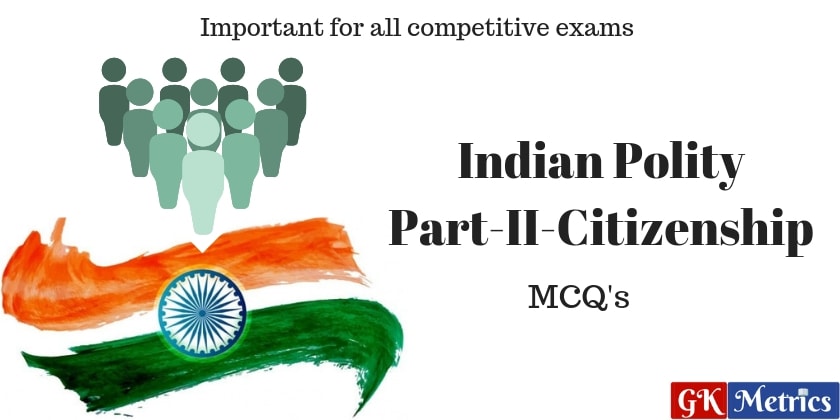11. To become a citizen of India, ________ is not a necessary condition.
A. Birth in India;
B. Descent;
C. Having property in India;
D. Naturalization;
[toggle]Ans – C [/toggle]
12. Which of the following parts of the Indian Constitution deals with citizenship?
A. Part I
B. Part II
C. Part III
D. Part IV
[toggle]Ans – B[/toggle]
13. According to Indian constitution, Domicile means _________ .
A. Temporary Home;
B. Permanent Home;
C. Home in the foreign country
D. Home in friend country;
[toggle]Ans – B[/toggle]
14. By the process of naturalization which one among the following can acquire the citizenship of India.
A. Foreigner
B. Non-Resident India
C. Overseas Indian;
D. All of the above;
[toggle]Ans – D[/toggle]
15. Through naturalization process, to become a citizen of India one must satisfy ________ condition.
A. L One must reside in India
B. His/her character should be good
C. Renounces his/her citizenship of other countries
D. All of above
[toggle]Ans – D[/toggle]
16. Which Article of the Indian Constitution deals with Persons voluntarily acquiring citizenship of a foreign State not to be citizens?
A. Article 5
B. Article 6
C. Article 8
D. Article 9
[toggle]Ans – D [/toggle]
17. Who is called the first citizen of India?
A. The Prime Minister
B. The President
C. The Speaker of Lok Sabha
D. The Chief Justice of India
[toggle]Ans – B [/toggle]
18. In Indian, the concept of single citizenship is adopted from
A. France
B. U.S.A.
C. England
D. Canada
[toggle]Ans – C[/toggle]
19. Who said, “A good citizen makes a good State and a bad citizen makes a bad State”?
A. Laski
B. Aristotle
C. Rousseau
D. Plato
[toggle]Ans – B [/toggle]
20. By which of the following modes can citizenship be acquired?
I. By Birth
II. Hereditary
III. By Registration
IV. By Request
A. I and II
B. I, II and III
C. II and III
D. II, III and IV
[toggle]Ans – B [/toggle]

